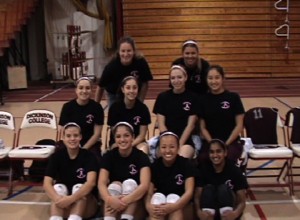Volleyball Digs for a Cure
During the month of October, the 11 colleges and universities in the Centennial Conference joined together during the 2008 volleyball season in the conference’s third annual "Digging for a Cure" campaign.
Prior to its designated “Digging for a Cure” match, each Conference school collected donations and pledges from friends, families, and team supporters for each dig the team recorded in selected match. A dig is a defensive play where a player prevents an opponent's attack from scoring by "digging" the ball before it hits the ground. Pledges and donations were then collected in the first week of November.
This year, the 11 teams combined for a total of 718 digs, and raised a total of $12,486.00. The money was donated to Living Beyond Breast Cancer (LBBC), a non-profit organization based in Haverford, Pa., dedicated to empowering all women affected by breast cancer to live as long as possible with the best quality of life. The Swarthmore team (pictured right) chose its October 11th match with the Dickinson Red Devils for counting digs. Both teams combined for 169 digs on the afternoon, led by Garnet seniors Erin Heaney and Jen Wang with 22 digs apiece.
(LBBC), a non-profit organization based in Haverford, Pa., dedicated to empowering all women affected by breast cancer to live as long as possible with the best quality of life. The Swarthmore team (pictured right) chose its October 11th match with the Dickinson Red Devils for counting digs. Both teams combined for 169 digs on the afternoon, led by Garnet seniors Erin Heaney and Jen Wang with 22 digs apiece.
A life-sized cardboard check, including a pink background in honor of Breast Cancer Awareness, was presented on Saturday, November 8 during the Centennial Conference Volleyball Championships at Gettysburg (Pa.) College. The Centennial Conference first became involved in “Digging for a Cure” in 2006 when Swarthmore head coach Harleigh Chwastyk brought up the community service project to the other Conference coaches. In the event’s three-year history, the Centennial volleyball teams have raised over $26,000 in donations and pledges.
About LBBC: Based out of Haverford, Pa., LBBC assists women at all stages of diagnosis, treatment and recovery. Their mission includes offering specialized programs and services for the newly diagnosed, young women, women with advanced breast cancer, women at high risk for developing the disease, and African-American and Latina women. They also offer programs for caregivers and health care professionals to help them better meet the needs of women affected by breast cancer. To learn more, visit the LBBC web site: http://www.lbbc.org/